A clogged air filter in a diesel engine can cause many issues that are hard to ignore. The most obvious sign is a lack of power. Your engine struggles to breathe, making acceleration feel sluggish and unresponsive. Fuel efficiency also suffers, as the engine burns more diesel to compensate for the restricted airflow.
Black smoke billowing from the exhaust is a classic symptom of a starved air supply. When the engine doesn’t get enough clean air, rough idling or even stalling can occur. Sometimes, you’ll experience hard starts, where the engine cranks longer than usual before coming to life.
If ignored, this problem can lead to more serious engine damage over time. If any of these symptoms sound familiar, it’s time to check the air filter. Diesel engines are susceptible to air quality, and a simple filter replacement can often restore your vehicle’s performance.
Let’s examine this: How do you know when your diesel air filter is failing and when to replace it?
Breathing Troubles
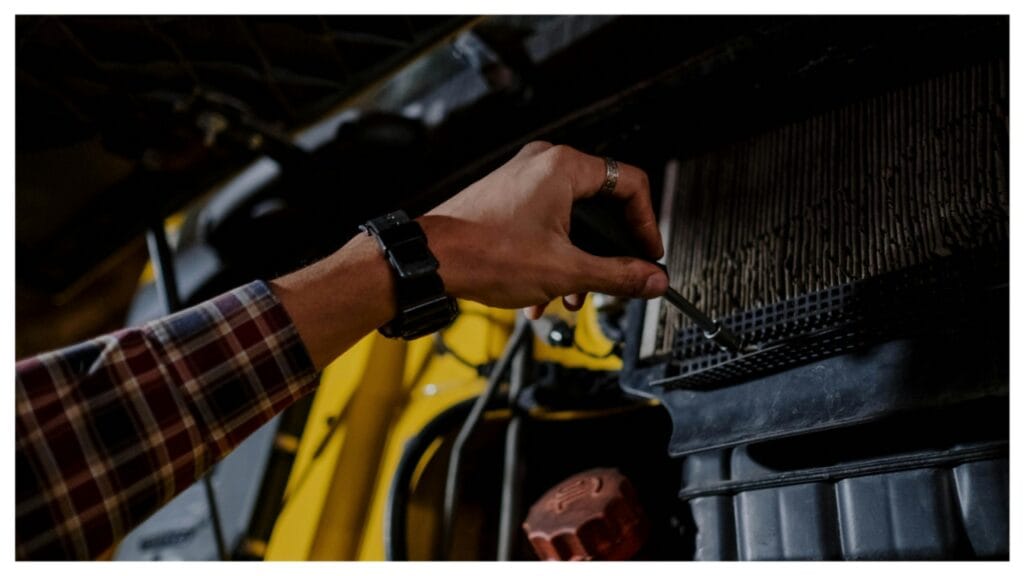
If your diesel vehicle suddenly feels like it’s got less oomph than it used to, this is your first clue. You’ll press on the pedal, and your truck will think about it.
Consider considering it for a bit. And then eventually pick up speed, but with a different eagerness than you’re used to. The engine is begging for air, but it’s being choked out by dirt, dust, and who knows what else.
Diesel engines are big on air; they thrive on it. Without it, they’re like a fish out of water. The air filter is something you should have remembered. It is the only thing between your engine and all the grime floating around.
The Terrible Fuel Economy
Here’s the thing: when your filter’s clogged, the engine isn’t getting enough air. It compensates by burning more fuel to try and make up the difference.
If your diesel seems thirstier than usual, check your air filter. Even if you haven’t made any crazy changes to your driving habits, your air filter is the culprit.
The Black Smoke Drama
Black smoke is diesel’s way of saying that when your air filter is clogged, the engine can’t mix the right amount of fuel with the air.
So, what happens? Incomplete combustion, which leads to the dreaded black smoke. It’s a sign something is seriously wrong, and often, it’s something as simple as a clogged air filter.
Weird Noises? It Is the Filter
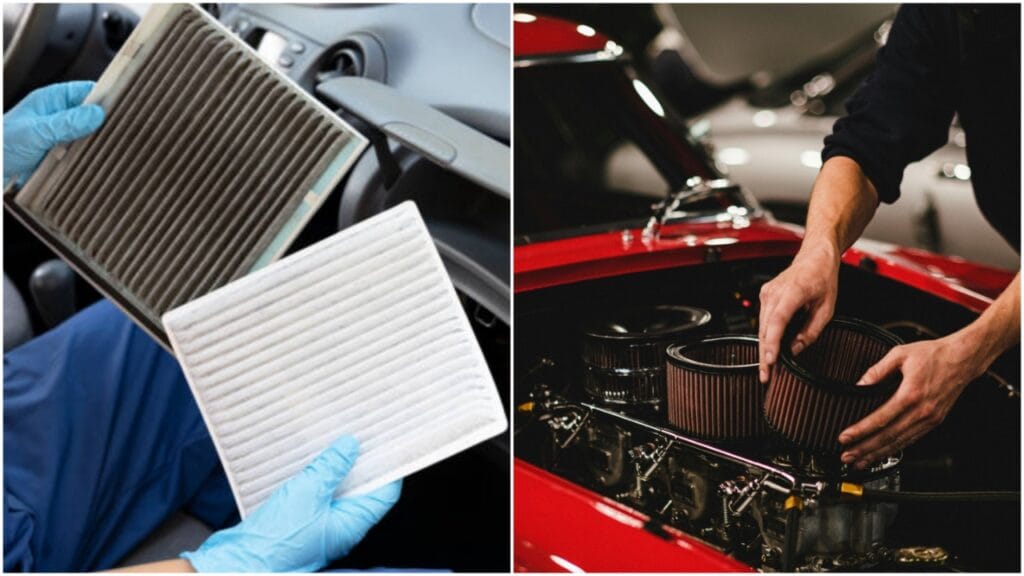
Now, this is one symptom that sneaks up on you. Diesel engines are naturally loud.
That’s part of the charm. But when things get a little too noisy, especially under the hood, you’ve got to pay attention.
How Often Should You Replace the Air Filter?
Things get tricky here because it depends on how and where you drive. There’s no magic number or formula, though I wish there were.
If you’re driving on paved roads, your air filter lasts a good while. You aren’t doing anything too extreme. I’m talking anywhere between 12,000 to 15,000 miles, sometimes more.
But if you’re driving your diesel through dusty back roads, you must swap it out sooner. The same goes for construction sites or spending much time in traffic. A good rule of thumb? Check every oil change.
Don’t Wait for the Warning Lights
If you’ve ever waited for a warning light before doing anything, let me be the first to say: don’t. Some modern diesel vehicles will tell you when the air filter’s getting bad.
Do you want to rely on that? By the time the light’s on, you’ve already lost fuel economy, performance, and who knows what else.
Your diesel is undoubtedly challenging, but you must give it some TLC. That air filter is its lung, and when it gets clogged, things go downhill fast.
The Big Lesson Here?
Replace your air filter before you even think you need to. Make it part of your routine, and your diesel will thank you. You may not notice the difference immediately, but you’ll undoubtedly see if you don’t.
Filters Aren’t Created Equal: What Kind Are You Using?
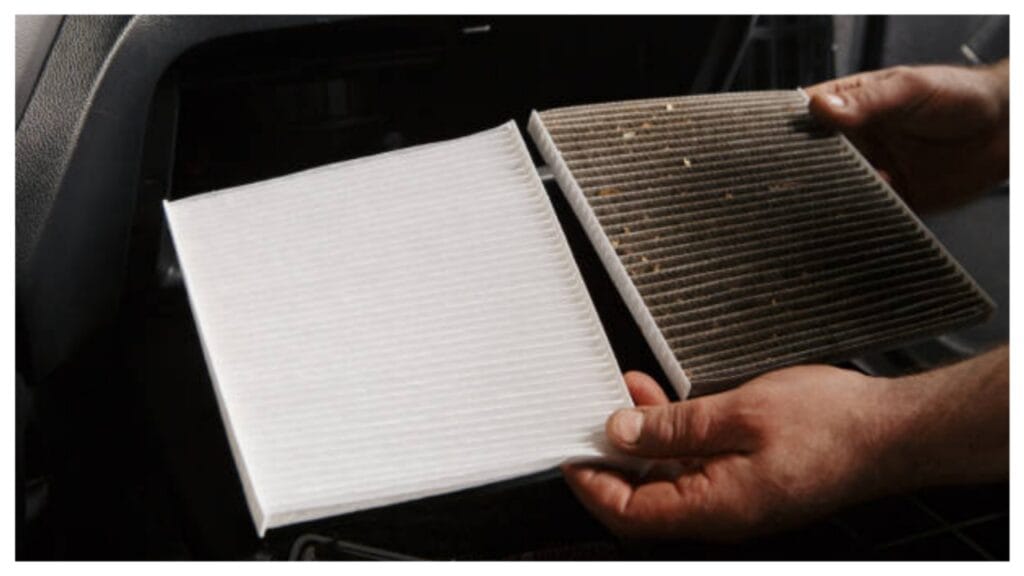
Not all air filters are the same, and this is something that often gets overlooked. The air filter you use in diesel engines can significantly impact performance.
It also affects longevity. There are two types: disposable paper filters and reusable cotton or foam filters.
Now, disposable filters are the standard. They’re cheap and easy to swap out, but they get clogged faster and need more frequent replacements.
Reusable filters are more your style. They cost more upfront. Still, they’ll last a long time with the proper cleaning routine. They can improve airflow better than paper.
What’s in the Air Matters: Location
Another critical thing that often needs to be said is that where you drive affects how frequently you should check your air filter and when you should change it.
You’re not thinking much about it. Yet, the quality of the air your diesel engine is sucking in makes a big difference.
Your filter is working overtime if you live in the desert. It also works hard if you are in a place that’s regularly dusty or dry.
This is to keep all that dirt and grime out of your engine. That means a clogged air filter will be a common problem for you.
It is more frequent than it would be for someone driving through urban or less dusty areas.
Performance vs. Protection: The Trade-Off
I don’t think this point gets enough attention. Balancing how much air you allow into the engine is crucial. It would help if you also considered how well you protect it.
Diesel engines thrive on air; the more it can get, the better it performs. But with all the junk floating around, you can only let your engine gulp down some of its wants.
That’s where the air filter comes in and is often a game of compromise. Filters with finer mesh are better at keeping out smaller particles, but they also restrict airflow more.
Conversely, performance filters let more air through but do not catch every little piece of dirt.
Environmental Impact: Reusable vs. Disposable
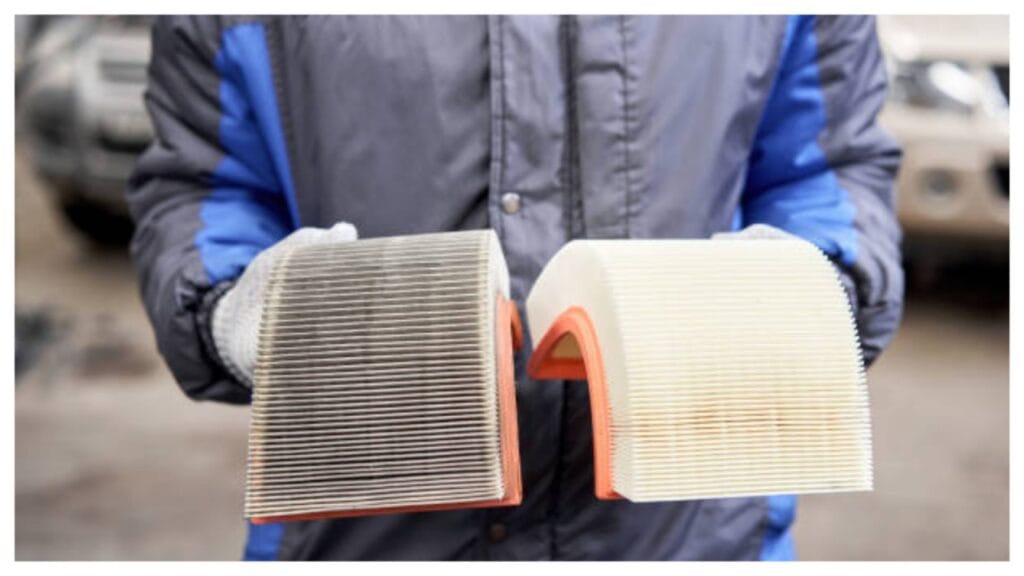
Here’s something that’s becoming increasingly relevant these days: the environmental impact of disposable air filters.
Using a standard paper air filter? Swapping it out every 10,000 to 15,000 miles? That process generates a lot of waste over the years.
Conversely, reusable filters are a great choice. Filters made of cotton or foam can be cleaned and reused many times.
This choice will save you some cash in the long run. It also reduces the amount of waste that ends up in landfills.
Engine Damage: What Happens If You Ignore the Filter?
It’s easy to get complacent about maintenance. You think, “Hey, the engine’s still running, so the filter can’t be that bad, right?” Let a clogged filter stay in there too long, and you’re setting yourself up for serious problems.
The lack of air entering the engine means incomplete combustion, and that’s okay for your fuel economy.
It’s putting stress on the engine, leading to higher temperatures and, over time, damaging the turbocharger or other components.
Diesel engines are rugged, but they’re not invincible. At its worst, a clogged air filter can lead to permanent damage, especially if the engine starts pulling in debris.
When to Go OEM and When to Go Aftermarket
OEM filters are designed specifically for your engine. They offer an outstanding balance between airflow and filtration and are built to factory specs.
This ensures you know what you’re getting. Aftermarket filters, on the other hand, can be hit or miss. Some are designed for higher performance.
They improve airflow, but some offer different levels of filtration. Others fit poorly or wear out faster than OEM options.
Wrapping It All Up
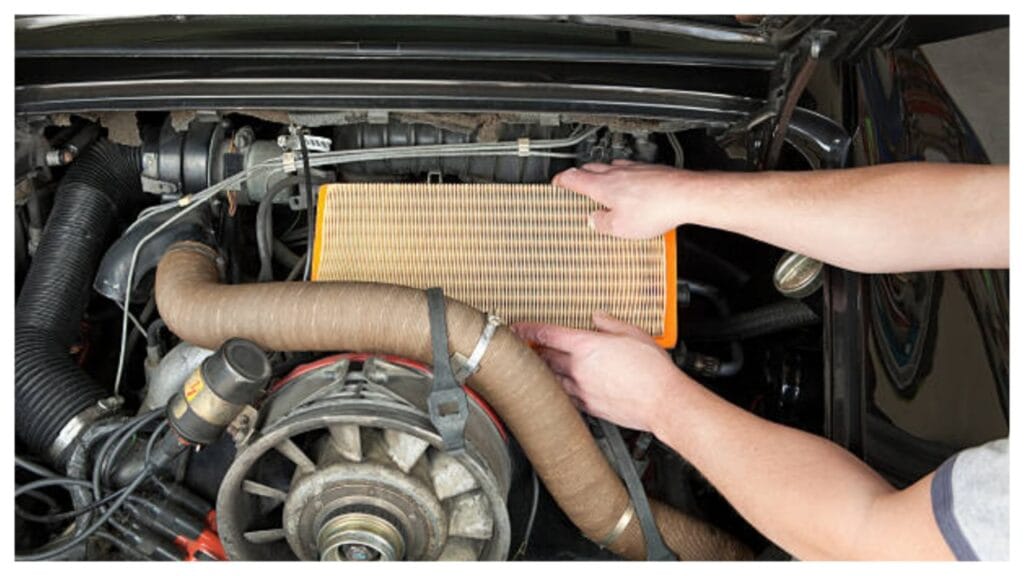
Although your diesel air filter seems insignificant, it is far more critical than people realize. Keeping it clean is essential whether you’re chasing performance or trying to avoid damage.
The takeaway? Be proactive. Don’t wait for symptoms to pile up before you act. Check your air filter regularly. Especially if you drive in harsh conditions, replace it early to avoid more significant issues.
Your filter choice depends on your driving habits and how much care you’re willing to give your diesel. Options include disposable, reusable, OEM, or aftermarket filters.
But whatever you choose, give your engine the clean air it needs to keep running smoothly.
FAQ’s
Air filter clogged symptoms?
A clogged air filter makes the car immobile. You might notice weak acceleration. The engine feels sluggish. Fuel economy takes a hit because it’s working harder.
The check engine light pops on. The engine may sound rough or even misfire. You could smell gas while driving.
If it’s awful, black smoke might come from the exhaust. Ignoring it can damage the engine over time.
Dirty air filter symptoms diesel?
A dirty air filter in a diesel engine can cause several noticeable symptoms. One of the most common signs is a decrease in engine performance. You may notice a lack of power, especially when accelerating or climbing hills.
The engine might also struggle to start or take longer to turn over. Another symptom is increased fuel consumption. If the air filter is clogged, the engine has to work harder to pull in air, which leads to inefficient fuel use.
You might also experience rough idling, with the engine running unevenly or shaking. In some cases, a dirty air filter can trigger the check engine light, as the engine struggles to maintain proper air-to-fuel ratios.
The engine may produce black smoke, which indicates incomplete combustion due to insufficient airflow. If you notice any of these symptoms, it’s a good idea to inspect or replace the air filter.
How often do you replace the engine air filter in the car?
Depending on your driving conditions, you should replace your car’s engine air filter roughly every 12,000 to 15,000 miles.
If you live in a dusty area or often drive on rough, unpaved roads, you must change it more often.
City driving in clean conditions lets you stretch it longer. The air filter keeps debris, dirt, and dust from entering your engine.
When it’s clogged, it can reduce fuel efficiency and hurt your engine’s performance. So, keep an eye on it and change it when needed to keep your engine running smoothly.
Will a clogged air filter cause a diesel engine to overheat?
Yes, a clogged air filter can cause a diesel engine to overheat. Diesel engines rely heavily on clean air for combustion, and when the air filter is blocked, the engine struggles to get enough oxygen.
This imbalance forces the engine to work harder, generating more heat than usual. Over time, the lack of air, mixed with the extra effort, can lead to overheating.
You notice a drop in performance or a sudden increase in fuel consumption, both signs that something’s off. The engine starts running hotter than usual, especially during heavy or long drives.
Ignoring a clogged filter risks overheating and can lead to long-term engine damage. Checking the air filter regularly and replacing it when it looks dirty is a simple way to avoid these issues.
Please keep it clean; your diesel engine will thank you by running more relaxedly and efficiently.
What happens if you don’t change the engine air filter?
If you don’t change the engine air filter, several problems can start. Over time, the filter gets clogged with dirt, dust, and debris. When that happens, your engine can’t get enough clean air for proper combustion.
As a result, your car’s performance suffers. You’ll notice sluggish acceleration and reduced fuel efficiency. The engine has to work harder, which can also increase wear and tear on critical components.
In some cases, if left too long, it even causes the engine to overheat. Worst of all, dirt can sneak past a completely clogged filter and get inside the engine, causing severe damage.
While it’s a small and inexpensive part, neglecting to replace it can lead to costly repairs. It’s a simple fix that can keep your car running smoothly.
Conclusion
Changing your car’s engine air filter is a simple but essential part of maintenance. Neglecting it can lead to reduced performance, lower fuel efficiency, and even engine damage.
A clogged filter forces your engine to work harder, which can cause overheating and increase wear on vital components. Regularly replacing the air filter ensures your engine gets the clean air it needs to run smoothly and efficiently.
It’s a small investment of time and money, but it can prevent more expensive repairs in the future and keep your car in top shape.

